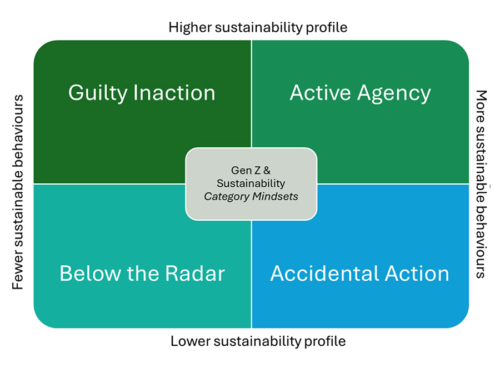
Marketeers understand the importance of Gen Z (born 1997-2013) as the consumers of tomorrow, so in our most recent study we set out to get to know this generation a little better.
Looking for Gen Z? Head to the gym! In this blog we explore Gen Z’s obsession with health and wellness – more so than any generation before – and how this links to sustainability. Going to the gym, making healthier food and drink choices, looking after mental health, were just some of the health & wellness priorities our participants talked about.
So, you might wonder, does their view of sustainability relate at all to their choice of gym? Unsurprisingly, the main reasons for choosing one gym over another are price, location, equipment, and not so much a gym’s carbon footprint, or its inclusive recruitment policy. But, unlike other categories where sustainable criteria are more top of mind, something else is at play here.
Essentially, young consumers feel that healthy living is intrinsically quite sustainable and hence tend to cut gyms some slack when it comes to assessing their sustainable credentials:
As contracts manager Emma, aged 25, puts it,
‘gyms are not the worst enemy’.
As healthy spaces, gyms are associated with a better way of living, and hence inherently quite sustainable. Gen Z are not alone in this thinking; indeed some academic studies (Woodcraft 2011, 16) define social sustainability as ‘a process for creating sustainable, successful places that promote wellbeing’.
We found that our Gen Z participants do also trust healthier products and services in other categories to be more sustainable – what you could call a positive ‘sustainability-halo’ effect; an effect seen in reverse as for ‘bad’ categories such as fashion or convenience food.
One participant, Mark, a 23-year-old hospitality worker from Bolton, was asked what he thought about the sustainability of his protein powder packaging:
‘’Just looking at it is enough for me [to make that judgement] … …. . I won’t look into exactly how sustainable it is. I just, I just look at the benefits of what it physically does for me”
That said, when a product with a ‘sustainable halo’ is found not to be living up to expectations, buyers can feel doubly let down. For example, finding out that a ‘healthy’ snack bar wrapper cannot be recycled after all makes buyers feel cheated and the blow back for the brand is negative.
So what does this mean for brands?
Amplify the positive
On the positive side, if your brand already operates in the health & wellness space, you will find that Gen Z will be more open and less cynical about any sustainable messaging and initiatives. Brands can seek to amplify this positive association and there is less risk of this being misinterpreted as greenwash.
Keep on the journey
On the negative side, because Gen Zers expect brands to be doing the right thing, there is a risk of undermining brand authenticity. For example, brown paper packaging that intrinsically appears to be recyclable but can’t because it is foil-lined. Or long ingredient lists with lots of unfamiliar ingredients. Or gyms that don’t automatically switch off lights in the changing rooms. And it’s also important to ‘stay in your lane’: tackle issues where you have direct impact, rather than just jumping on a good cause.
Connect to health and wellness
For brands outside the health and wellness sector wanting to connect with Gen Z, it’s worth thinking about how to develop a positive health & wellness impact as a way of supporting your sustainability credentials.
Want to know more about our Gen Z – Connected Lives research series? Get in touch with us at info@brand-legacy.com






